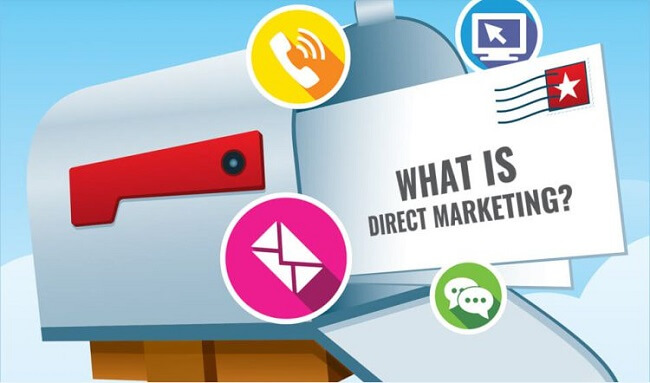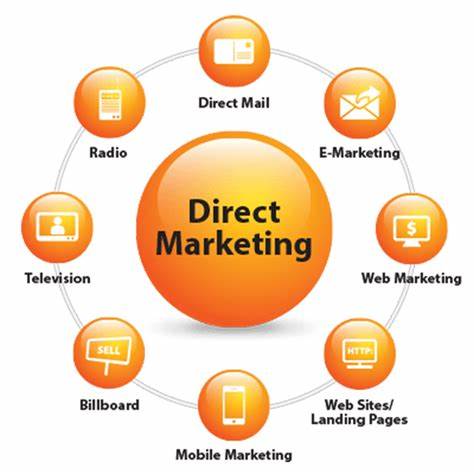Advantages and Disadvantages of Direct MarketingDefinition of Direct MarketingAny business's marketing campaign's success is its foundation. Companies can only sell their products and grow their enterprises with effective marketing strategies. Showing products to customers there are numerous forms of marketing strategies. Direct marketing is a method of advertising that doesn't depend on any channel and enables companies and nonprofits to speak with consumers directly. Text messaging, email, interactive websites for consumers, online display ads, flyers, catalog distribution, promotional letters, targeted television commercials, response-driven newspaper and magazine ads, and outdoor advertising. It is also known as Direct Response Advertising among practitioners of the industry. Direct marketing enables the company to observe instant results from its clients and prospects when using a marketing campaign. Various forms of direct marketing use instruments for direct marketing and permit a direct response. The purpose of a direct marketing campaign is to establish a personal connection between the client and the marketing company. The company uses one or more marketing channels to speak directly to a pre-selected consumer or customer category in a direct marketing campaign. 
The ability of customers to respond directly to marketing activities, particularly with orders and purchase requests, is a major component of direct marketing. Direct marketing differs from conventional advertising formats in that it conveys messages one-to-many. In traditional ad formats (billboards, print publications, television advertisements, etc.), the marketing company relies on intermediaries to disseminate its promotional message to huge audiences of consumers in the hopes that some customers who see the ad would seek out the company and its products. Typically, direct marketing occurs without intermediaries or mass communications, directly between the marketing firm and the customer. 
Direct marketing promotes your business to your target market or the goods or services it offers. Unlike mass marketing, which lacks targeting yet still reaches a large audience, like a conventional TV commercial. A call to action is one of direct marketing's most important elements. The objective is for your customer to take some action that can be measured, such as making a purchase, going to a website, or signing up for a trial. Advantages of Direct marketing
A targeted sales opportunity might be presented to encourage consumers to consider the value proposition offered. You're supplying them with the knowledge they require to make an informed choice in a convenient setting, such as their office or home.
A prospect will conduct up to 90% of the individual research necessary to feel confident about a product. They'll research you online, evaluate you against the competition, and investigate your reputation. Utilizing the direct marketing materials you've sent them, you may take care of that final 10% when they get in touch with you. This provides you with a lot more effective way to make a sale.
The value of a handshake and a smile has been demonstrated time and time again in the corporate world. It may not be the same as shaking someone's hand, but if you do it well, the outcome might be the same when you write a personalized message to them. A chat between two people is the best way to start a relationship. Alternatively, call a friend. Alternatively, arrange a meeting to go over how what you have can help a prospect solve their difficulties.
It's impossible to match how economical direct marketing may be when seeking to attract local customers. The cost of making a phone call to someone is what? Alternatively, how much does it cost to print a few brochures on your printer and deliver them to people in your neighborhood? There are few chances for a small business to demonstrate how it can satisfy demands and desires for such a low expenditure if it wants to increase its market share.
Even if you follow all the right steps, your reputation can still suffer due to the involvement of outside parties. Direct marketing eliminates the problematic middleman by putting you in direct contact with the potential clients you might one day serve. This implies that you have more control over the message that each person in your target audience hears through your marketing activities.
You don't need a sizable staff behind you to start direct marketing. One person can produce marketing materials to reach potential clients if they have a computer and printer. The ROI from a direct marketing effort can be highly good, even though response rates tend to be rather low, with little to no overhead and just small investments necessary.
You can send particular communications to customers and potential customer groups based on demographics and purchasing patterns. Your campaigns will be more successful if they are more specifically focused.
Connect with your audience on a personal level. A chat over the phone may establish a customer's relationship with your company. You can send direct mail or emails with particular recipients and even include information like past orders.
Techniques like email marketing or leafleting are often done at a very low price. Mass media advertising for SMEs will typically be more expensive than direct marketing. Disadvantages of Direct marketing
Many businesses send direct marketing chances to those uninterested in what is being given. When that is an email, it is considered spam. It's referred to as rubbish while it's in the mailbox. A waste of money is what it is referred to as in terms of your budget. People will delete your messages, discard them, or hang up on you.
The creation of registers to allow consumers to block marketers from contacting them resulted from how intrusive this form of marketing used to be. Almost invariably, potential buyers are interrupted by this kind of promotion. When this happens, the customer often gets the impression that you're pressuring them into buying something they truly don't want. Although you might capture a prospect's interest, the likelihood is high that you'll have damaged their perception of the interaction if you don't develop a compelling value proposition.
This is particularly valid regarding some modern emails or direct mail campaigns. It's comparable to viewing a four-column blog. In truth, you need to figure out where to begin your search. The prospect will then give up on the opportunity offered due to the confusion that sets in when that occurs.
The response rates for direct marketing frequently range between one and three percent. It's noteworthy to note, though, that the same conversion rates frequently apply to some online marketing initiatives. In this case, however, 3% of online conversions were good, while 3% of direct conversions were unfavorable. Yes, clients won't be interested if they aren't interested, and you'll have wasted your time and money. Low response rates can be challenging to accept in that context.
There will be a time investment if you're writing a tailored message to send to each person on a marketing list that you're contacting. You may find yourself writing hundreds of messages or making thousands of phone calls even though this is an effective method. Even more, time must be invested after you include the time required to establish confidence using these techniques.
Have you ever noticed that company enjoys suffering? Because they are unexpected, bad experiences are more frequently shared by people. Even if you do everything correctly, if a customer expects you to satisfy their demands and you do, you won't get a good review. When you fail to fulfill that "duty," the unpleasant experience is shared. Then it spreads as a result of other people sharing their terrible experiences. With most direct marketing initiatives, you interrupt individuals, exacerbating that animosity.
The truth is that individuals will typically take advantage of a fantastic offer if they come across one, but later on, they will only pay the full price for the product for several reasons. You'll observe that many potential customers ultimately conclude that your supply was insufficient. Even the most successful direct marketers occasionally feel like giving up when that occurs frequently. This may not be the best marketing strategy to adopt if you lack patience or find it difficult to maintain consistency in your brand message.
This entails marketing to their friends and family for many startup enterprises. This mix also includes any current clients you may have. I hope these people will represent your brand as brand ambassadors. The truth is that talking to your core group of friends all the time can put you in a very awkward situation. The Conclusion:Direct marketing allows us to market our goods and services directly to the clients who require them the most. In other words, direct marketing delivers an offer in which businesses speak directly to the clients who have already been chosen. Between the customer and us, there is no intermediary or advertising organization. In direct marketing, we ask our clients to take a particular action. Similar to using our option, going to our website, buying our thing, and subscribing to our link. We frequently only market our product through direct marketing to some. |
 For Videos Join Our Youtube Channel: Join Now
For Videos Join Our Youtube Channel: Join Now
Feedback
- Send your Feedback to [email protected]
Help Others, Please Share









